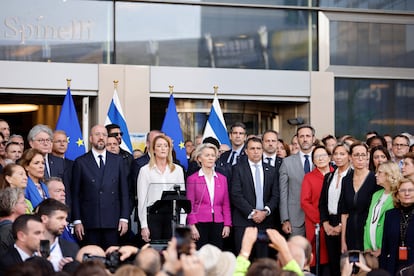Israel, Nagorno-Karabakh, and other crises: why the EU is surrounded by conflicts
An era of instability, with changes in the attitudes of large and medium powers, seems to have encouraged turbulence, and the Union is not well prepared to face them

The world watches in suspense as the aftermath of the conflagration unleashed by Hamas’ barbaric attack on Israel unfolds. This is the umpteenth outbreak of violence in the vicinity of the European Union. Ukraine, Nagorno-Karabakh, Syria, Israel and Gaza, Libya, the Sahel: a crescent of terrible conflicts borders the EU on its eastern and southern flanks. The triggers are of course different in each case. But in all of them an era of instability has played a role, with changes in the attitudes of large and medium powers seeming to encourage violent escalations. The entire arc of crisis, with the exception of Ukraine, shows the very limited ability of the EU to have an influence on this environment.
This period of volatility is one in which Russia has sought to forcibly reconfigure the world order, China has gained strength, the United States has reoriented itself to address the rise of Beijing, Iran has reaffirmed its antagonism to the West, and the Global South has mobilized against Western dominance in new ways. This geopolitical panorama influences the arc of instability.
Let’s start with the violence unleashed by Hamas’ attack on Israel. This is a criminal decision by its leaders, in which there are no ifs or buts. This does not mean that we should not analyse the context in which it has arisen, and which will have undoubtedly influenced its planning. This shows, on the one hand, Iran — a supporter of Hamas and Hezbollah — fully aligned with the attitude of open defiance to the West, of an unleashed Russia, and an increasingly assertive China. Tehran’s position must also be read in light of the collapse of the perspective opened by the nuclear treaty sealed with the Obama Administration and torn up by the Trump Administration. On the other hand, Israel has not suffered any significant pressure to modify its abusive occupation policy.
Without doubt, the prospect of growing normalization of relations between Israel and Arab countries has also played a role, which Washington has promoted to improve Israel’s security but also as a tool to shore up its waning influence in the region. This is the context of vulnerability and a change of attitude in which Hamas’ decision was taken. At none of these levels has the EU (in favor of pursuing the path of a nuclear pact with Iran) had, nor does it have, an important role.
Of course, the war in Ukraine has taken center stage in this era of political uncertainty. It is the episode that embodies the frontal challenge to the global primacy of the West from Russia, which believed itself to be strong again after the dissolution of its empire and the turbulence of the nineties. The Russian offensive in Ukraine is one of the keys to reading what happened in Nagorno-Karabakh a few weeks ago. With Moscow completely occupied on that first front, Azerbaijan (backed by Turkey) has taken the initiative to forcefully resolve the conflict with Armenia, traditionally protected by the Kremlin. The political weakness and shift in the general balance of power undoubtedly incited action, opening a window of opportunity. The EU was almost irrelevant here.
Russia and Turkey are also key actors in Syria and Libya, albeit on opposite sides. Moscow has supported Bashar al-Assad in the first conflict and Marshal Khalifa Hafter in the second. Ankara is on the other side. In neither case has a war been unleashed like it was years ago, but there is still violence and bombings in Syria and a lot of unpredictability in Libya. In the first case, the Kremlin took advantage of the geopolitical absence of the US and the EU to intervene and determine the future of the conflict. In the second, there was indeed a Western intervention, but the disinterest of Washington — busy with other issues — and the limits of the EU have paved the way for the chaos into which Moscow and Ankara have inserted themselves.
The crises in the Sahel, like the others, has largely arisen from local problems. In this case, they stem from a lack of prosperity and democratic maturity. But, here too, the era of global instability has undoubtedly been a context that has encouraged turbulence. Russia, once again, has offered the prospect of support to rebellious and authoritarian sectors of those societies that have continued to harbor anti-colonial suspicions. They perceive Moscow, a power that seeks an imperial and colonial projection in its own environment, as the heir of the USSR, which supported various processes of decolonization in the last century. Here too, the EU — with France as the protagonist — has suffered a harsh reality check regarding its ability to influence and interact in the region.
Not even a superpower can control how certain crises develop. Nobody expects the EU to do it. But the outbreak of conflicts in Europe and its surroundings in this time of uncertainty, of changes in forces and attitudes, should make us think. The Union has had a reaction worthy of the circumstances in the case of Ukraine, achieved with good will and ingenuity, but it remains ill-prepared in structural terms to act in this new, white-hot context. The path to achieving this is not easy and does not guarantee being able to avoid or protect itself from certain crises. There are many questions, but the answer is almost always more common foreign and security policy.
Sign up for our weekly newsletter to get more English-language news coverage from EL PAÍS USA Edition
Tu suscripción se está usando en otro dispositivo
¿Quieres añadir otro usuario a tu suscripción?
Si continúas leyendo en este dispositivo, no se podrá leer en el otro.
FlechaTu suscripción se está usando en otro dispositivo y solo puedes acceder a EL PAÍS desde un dispositivo a la vez.
Si quieres compartir tu cuenta, cambia tu suscripción a la modalidad Premium, así podrás añadir otro usuario. Cada uno accederá con su propia cuenta de email, lo que os permitirá personalizar vuestra experiencia en EL PAÍS.
¿Tienes una suscripción de empresa? Accede aquí para contratar más cuentas.
En el caso de no saber quién está usando tu cuenta, te recomendamos cambiar tu contraseña aquí.
Si decides continuar compartiendo tu cuenta, este mensaje se mostrará en tu dispositivo y en el de la otra persona que está usando tu cuenta de forma indefinida, afectando a tu experiencia de lectura. Puedes consultar aquí los términos y condiciones de la suscripción digital.









































